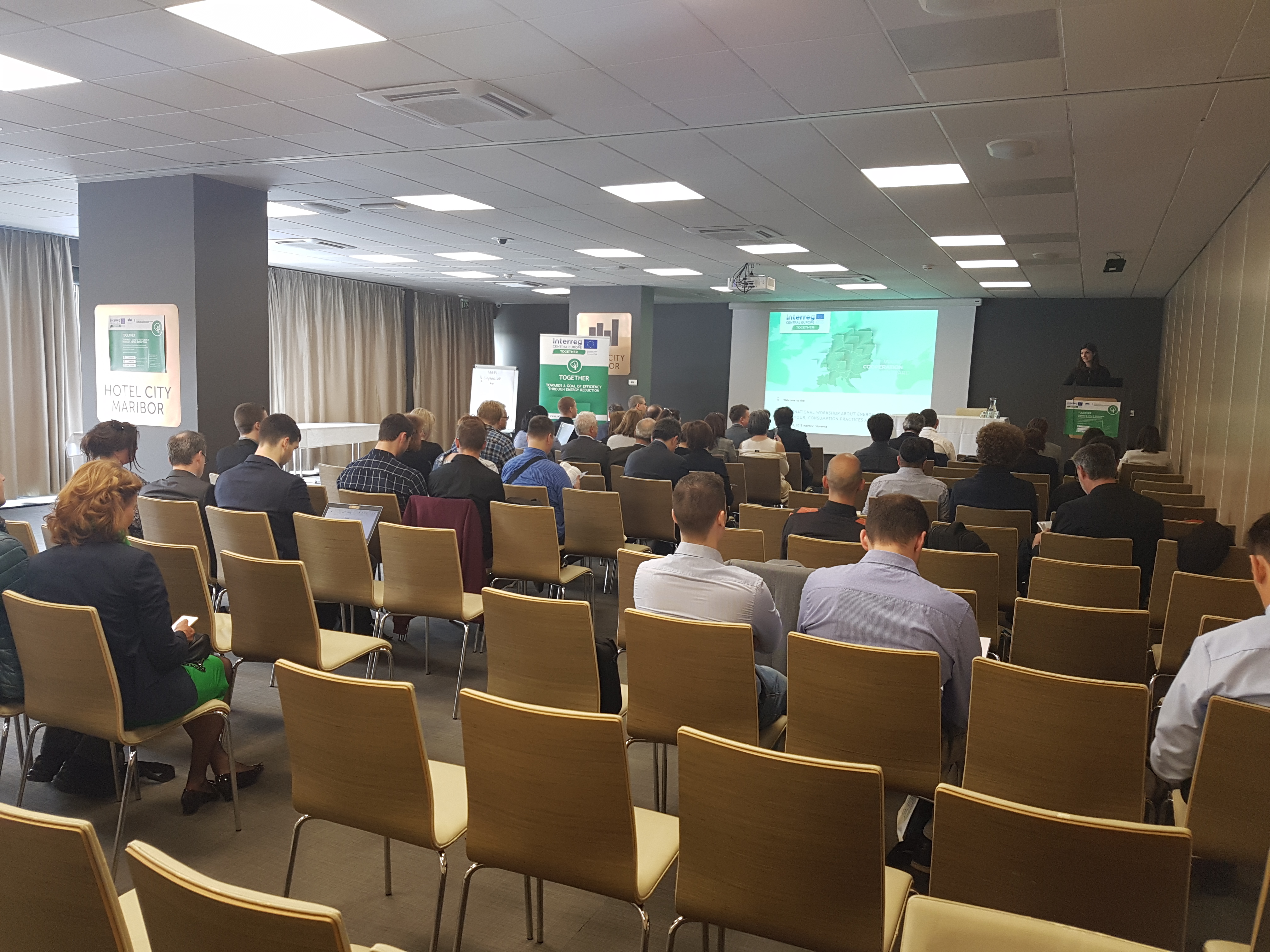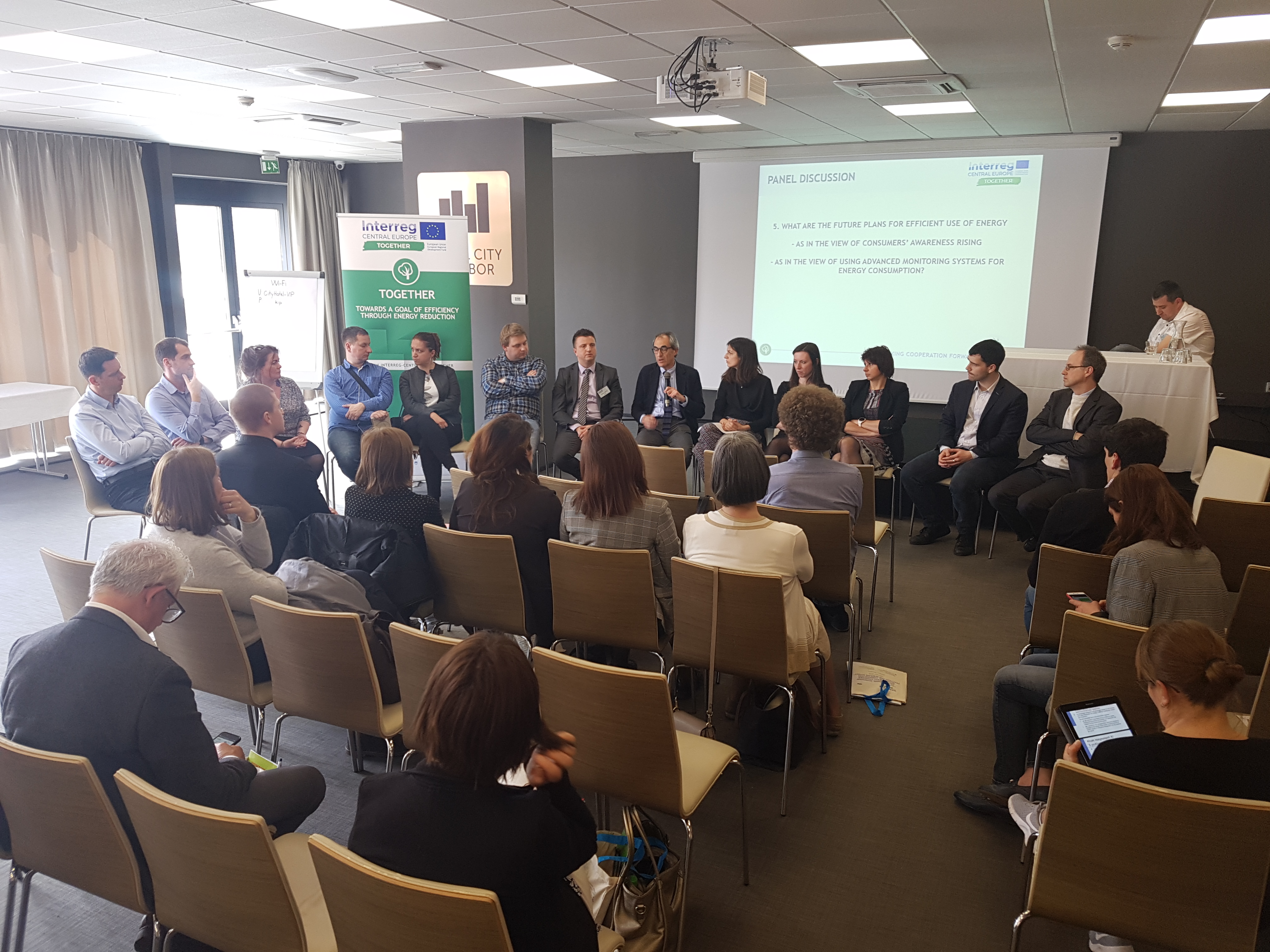Press release of the workshop:
“INTERNATIONAL WORKSHOP ABOUT ENERGY CONSUMER BEHAVIOUR, CONSUMPTION PRACTICES AND REBOUND EFFECT”
On Tuesday, 10th of April 2018, the University of Maribor, Faculty of Energy Technology, has organised an INTERNATIONAL WORKSHOP ABOUT ENERGY CONSUMER BEHAVIOUR, CONSUMPTION PRACTICES AND REBOUND EFFECT in Hotel City Maribor, Slovenia.
The current economic situation calls on public institutions to limit investment in the energy performance of buildings. Central Europe faces the absence of a holistic approach and limited resources to deliver energy-efficient solutions. The »TOGETHER - TOwards a Goal of Efficiency THrough Energy Reduction Project« changes the insight of management from the fragmented into the whole and establishes the relationship between the physical space, the devices of modern technologies and the behaviour of users. The international workshop brought together experts and ambassadors of good practices who presented methods and approaches to successfully change consumer behaviour and to understand their needs for efficient energy use. They have also discussed support activities for the efficient use of energy in public buildings, tools for effective demand management and approaches aimed at technological devices.
"Experience shows that, even if the potential for reducing energy is obvious and high, the reduction will not happen by itself," said Mr. Antonio Zonta, Director of Building Estate and Public Tenders Department in the Province of Treviso and Lead Partner of the Project Together (Italy). "It's not just about combining the best technologies, but also about the question of the behaviour of the involved individuals and key stakeholders. It's not buildings that save energy, it's the people."
Dr. Janez Petek, Director of Local Energy Agency Spodnje Podravje (Slovenia) presented the project “Premakni porabo”, which is part of a wider, 3-year Slovenian-Japanese smart network and smart communities project.
Mr. Francesco Molinari of the Politecnico Milano Faculty (Italy) explained in his lecture that "people develop an energy culture based on interactions between norms, material culture and practice. All three components need to be understood as the ability to access an individual's behaviour in the area of efficient use of energy. "
The second part was opened by Mr. Fabio Dandri, from the Energy Agency of Friuli Venezia Giulia (Italy), who introduced DSM - Demand Side Management and initiatives to control user behaviour to improve energy efficiency.
M.Sc. Jure Vetršek, from the Institute for Innovation and Development, University of Ljubljana, (Slovenia), emphasized that "the user is at the heart of the building ecosystem, and an interdisciplinary approach is necessary to address the challenge of energy efficiency."
Dr. Vlasta Krmelj from the Energy Agency of Podravje, Institute for Sustainable Energy Use, (Slovenia) presented the experiences with the users and the impact of users on energy consumption and stressed that "the system for monitoring and verifying performance is essential for the efficient implementation of energy efficient measures and achievement of the set goals."
Assoc. prof. dr. Tamas Csoknyai of Budapest University of Technology and Economics, (Hungary) presented the international “Greenplay” project, within which the Apolis Planeta game developed, with which they want to change the behaviour of users in residential buildings.
For the conclusion of the second part, prof. dr. Damijan Mumel from the Faculty of Economics and Business, University of Maribor, (Slovenia) delivered a lecture on attitudes and presented a multi-attribute model of attitude measuring.
The third part of the international workshop was opened by assoc. prof. dr. Peter Virtič from the Faculty of Energy and Technology, University of Maribor (Slovenia) with a presentation of improving energy efficiency by monitoring energy consumption.
Mr. Jure Jazbinšek from the Nuclear Power Plant Krško, Nuclear Technology Business Unit, (Slovenia) presented a map of energy consumption in Europe Electricity Map and tested the nuclear power plant simulator with all participants.
The workshop concluded with a panel, which included project partners and key stakeholders at the national and international level who shared their experience with the implementation of project activities and developed a vision for the development of project activities and the project itself.
Presentations of the workshop (click to download)


